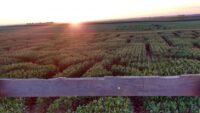The believer’s privilege
By Submitted Article on August 22, 2020.
THE BRANCHES
Last of four parts
Jacob M. Van Zyl
The apostle John jubilated, “Behold what manner of love the Father has bestowed on us, that we should be called children of God” (1 John 3:1). In the context of John 15, we may rephrase it: “Look what privilege the triune God bestowed on us that we may be branches of the vine, who is Christ our Lord.”
The branches grow out of the vine: they are extensions of the vine. The fibres of the two are intertwined, and the same sap flows through both.
I lived for several decades in a region that produced grapes for eating and winemaking. I worked as student on such a farm for a few months.
Weeds steal the vine’s food and water; therefore, weeds between the rows were regularly plowed in, but the banks below the vines were turned over by spade.
The branches were pruned to impede over-growth of foliage and stimulate fruiting: “Every branch that bears fruit, he prunes, that it may bear more fruit” (John 15:9).
To remain fruitful branches, Christians have to be pruned by trials. “Weeds” (sin) must be eradicated by meditating God’s word at home and church.
When grapes meant for eating are about half-size, the clusters are pruned, too, giving them the preferred heart-shape. Likewise, Christians must finetune their work for the Lord, always looking for ways to improve it, increasing the results of effort, time, and money, and reducing waste of these.
The huge leaves of the branches form a canopy, protecting grapes from harmful mid-day sun. Even workers find welcome shade under the vine’s umbrella during lunchtime.
The Bible describes times of peace and plenty as “everyone sitting under his own vine or fig tree” (1 Kings 4:25, Micha 4:4). It gets terribly hot in Israel during summer, especially in the Jordan Valley.
One of the branch-functions of Christians is to protect the vulnerable. Right from the start, the early church attended to the needy. The “haves” shared with the “have-nots,” leading to the tradition of love-meals, today’s potluck.
The main job of the vine’s branches is to bear fruit, good fruit, much fruit. In the next section (John 15:9-17) fruit is identified as agape, sacrificial love. The apostle Paul concurred with that in his letters (Gal. 5:22, Rom. 5:5, 1 Cor. 13).
Love can be expressed in many ways by believers. Safe and courteous driving on the road, obeying traffic signs, parking properly between the lines, avoiding scratching other cars, and taking driving conditions into account are ways to show neighbourly love.
An attitude of friendliness, helpfulness, and moral support at work, home, church, school, sports, and recreation is a practical way to be fruitful branches, producing agape love.
21-20




